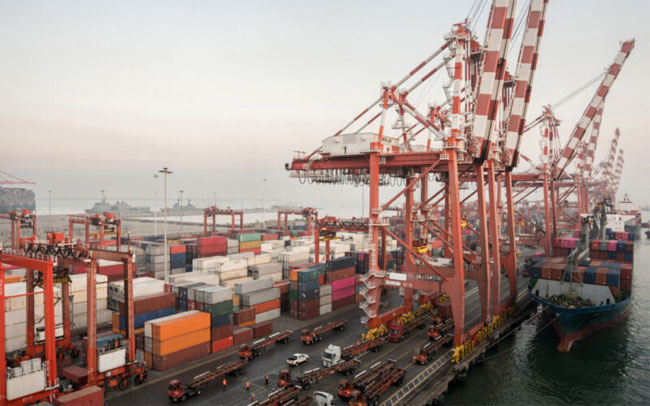July 30, Colombo (LNW): K. D. S. Ruwanchandra, Secretary to the Ministry of Ports, Naval, and Aviation Services, announced that Colombo Port has been recognised by Alphaliner as the world’s fastest-growing port in the first quarter of 2024, thanks to its outstanding operational performance and a 23.6 per cent growth rate.
The port generated USD 50 million in revenue during this period, unaffected by past trade union actions.
Speaking at the “Two Years of Progress and Way Forward” briefing at the Presidential Media Centre, Ruwanchandra highlighted the significant strides made by Colombo Port. In 2023, the Sri Lanka Port Authority reported a profit of USD 100 million, with half that amount already earned in the first quarter of 2024.
Enhancements at all four terminals and ongoing construction at the Eastern Container Terminal (ECT) and the Western Terminal, which is set to commence operations in February 2025, are pivotal to this success.
Further development is in progress at the Eastern Terminal and Northern Port, alongside projects at Trincomalee, Galle, and Kankasanthurai ports.
A new passenger ferry service from India now operates every Friday from the recently constructed terminal at Kankasanthurai Port.
Airline operations have also seen a 25% improvement compared to 2023, with significant increases in both passenger and cargo services.
The number of air service arrivals rose from 36 in 2023 to 46 by July 2024.
Eng. Athula Galketiya, Chairman of Airport and Aviation Services (Sri Lanka) Ltd. (AASL), reported that by July 2024, international passenger movements reached 4.3 million, with an expected total of 9 million by year’s end, reflecting a 26.10% increase from July 2023.
International air traffic and cargo movement grew by 24.50% and 28.96% respectively, compared to the same period last year.
Plans are underway to enhance facilities at Bandaranaike International Airport, including the addition of departure counters and e-gates.
Construction on a proposed second terminal is expected to resume soon, with funding from the Japan International Cooperation Agency (JICA).
The project aims to accommodate an additional 9 million passengers by 2028.
The government has also addressed the resignation of Air Traffic Controllers due to salary issues by recruiting and training new personnel, ensuring smooth air traffic operations.

